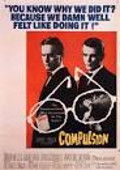
Directed by
Richard Fleischer
103 minutes
Rated M
Reviewed by
Bernard Hemingway

Compulsion
Based on the infamous real-life 1924 Loeb-Leopold murder in which two wealthy A-students at the University of Chicago kidnapped and killed 14-year-old Bobby Franks, the son of a rich neighbour as a demonstration of their self-proclaimed intellectual superiority which, they thought, under the influence of Nietzsche’s writings, absolved them of responsibility for their actions, Compulsion is based on a book of the same name by Meyer Levin adapted by Richard Murphy and economically-directed by Richard Fleischer.
Indicative of the film's high-mindedness the actual incident is left off-screen with the film having a three part structure: The sketching-in of the young men’s characters - the charismatic Artie Strauss (Loeb) and the introverted, submissive Judd Steiner(Leopold) who had a homosexual crush on him and their college milieu; their questioning and arrest by the State Attorney (E.G. Marshall); and their courtroom defence by Jonathan Wilk (Orson Welles). In real life the defence attorney was Clarence Darrow well known as an opponent of capital punishment.
Dishevilled, portly and rumbling like an approaching storm Welles dominates the film as the deceptively sharp-witted lawyer, giving a well-written showstopping twelve minute oration (in reality it went on for twelve hours) condemning capital punishment and pleading for the boys' lives.
As the youths both Bradford Dillman and Dean Stockwell, supposedly teenagers are, the fashions of the time when the concept of “teenagers” did not exist notwithstanding, both too old for their parts (Dillman was twenty-nine, Stockwell twenty-four) but both hold our attention with Stockwell giving one of best performances of his long career.
FYI: Both young men were sentenced to life imprisonment plus 99 years. Loeb was killed by a fellow prisoner in 1936 for reasons unknown and Leopold was released on parole in 1958.
Alfred Hitchcock’s Rope 1948 was a version of the same case.
Want something different?





